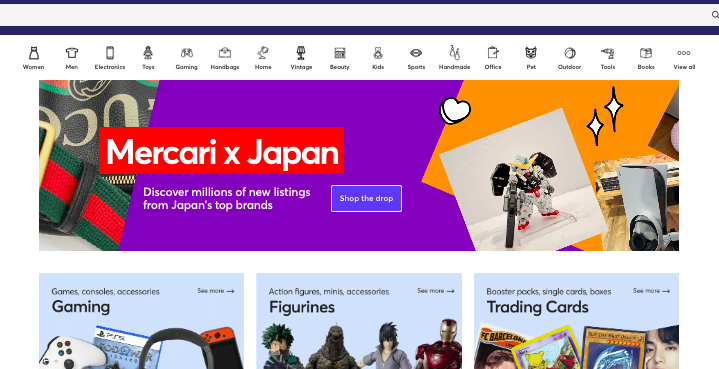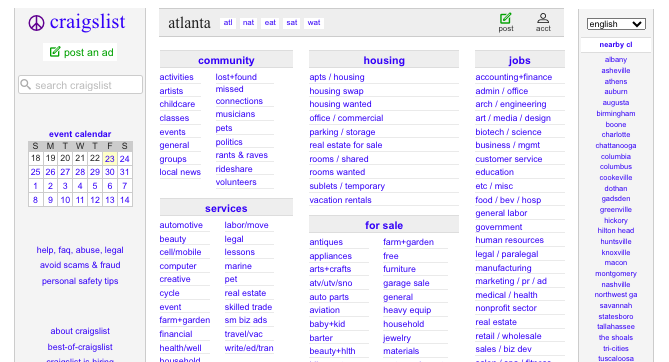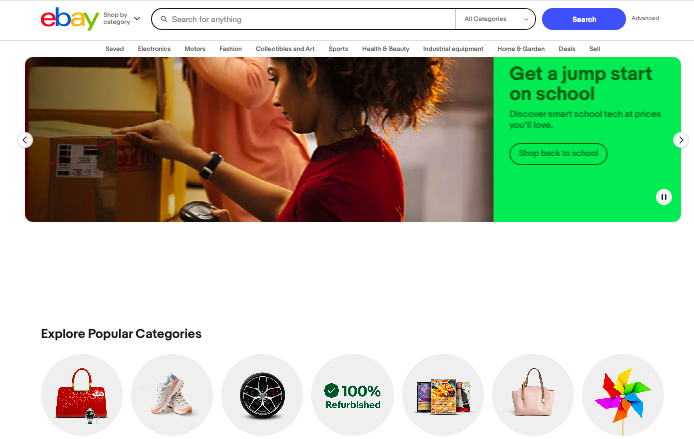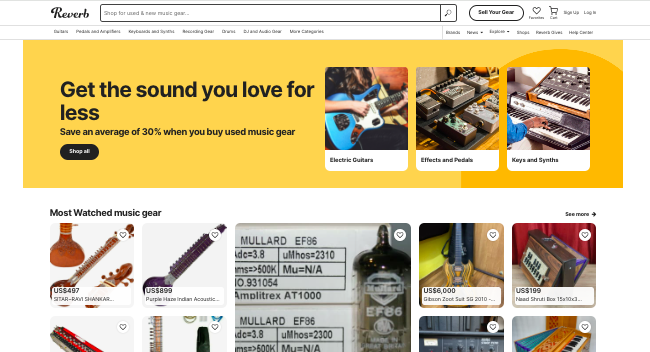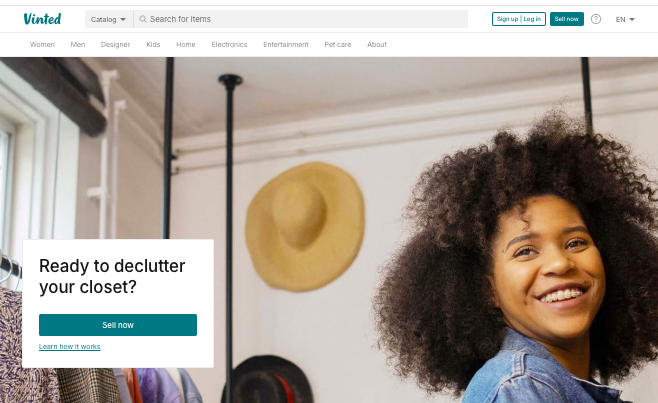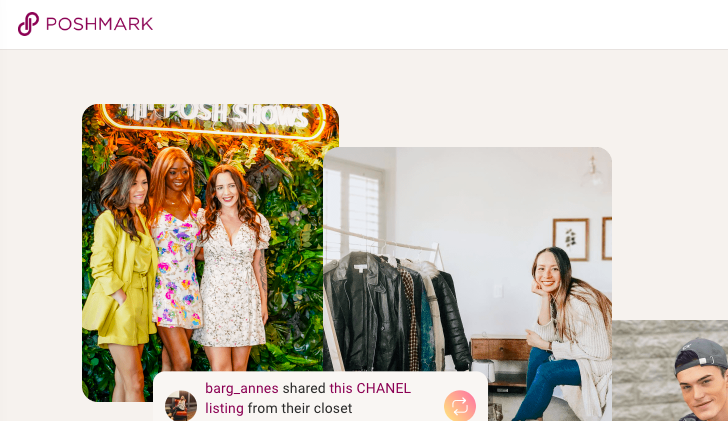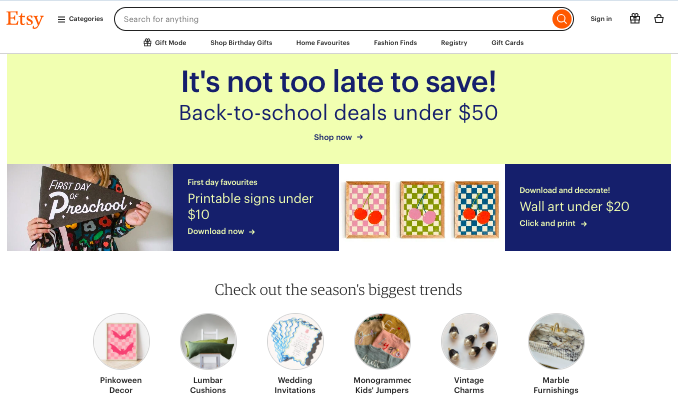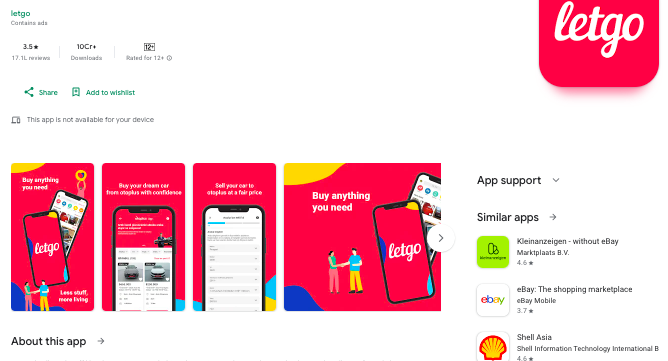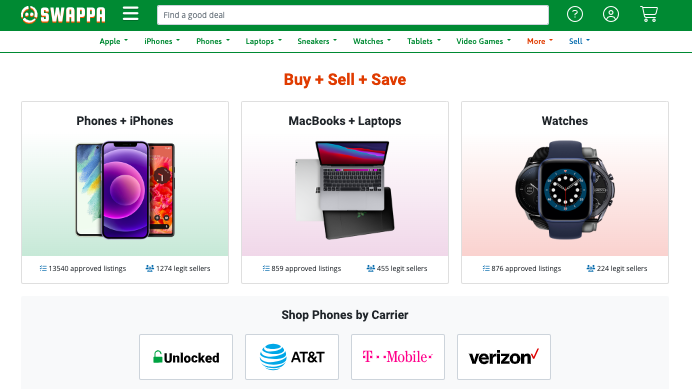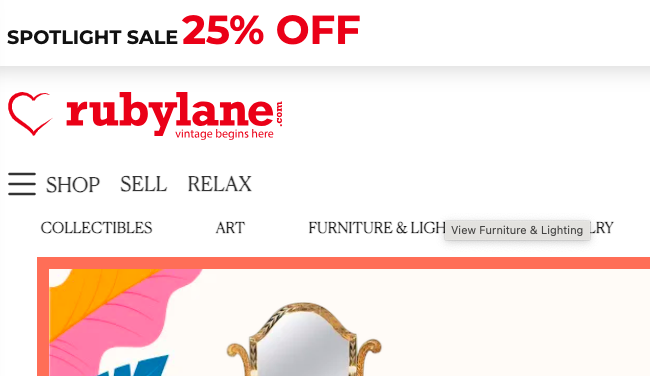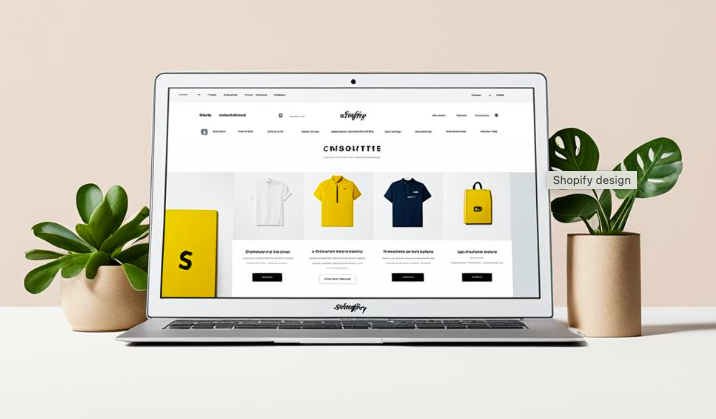Facebook Marketplace is a platform integrated within Facebook that allows users to buy, sell, and trade items with others in their local community and beyond.
It provides an intuitive interface for listing products, browsing listings, communicating with buyers/sellers, and completing transactions.
Users can list a wide range of items on Facebook Marketplace, from furniture and electronics to clothing and vehicles.
While Facebook Marketplace boasts millions of active users and local accessibility, it falls short in delivering advanced targeting options and a credible atmosphere for buying and selling.
The interface can quickly become cluttered with unrelated social media content, making it challenging to find relevant listings or connect with potential buyers.
If you find yourself seeking more effective avenues to showcase your items, you’re not alone. Understanding the alternatives to Facebook Marketplace, such as eBay, Etsy, and OfferUp, can open doors to enhanced opportunities for online selling.
In this guide, you’ll explore some of the best Facebook Marketplace alternatives, ensuring you don’t miss out on reaching your target audience and maximizing your sales potential.
Read on.
1. Mercari
Mercari is an excellent alternative to Facebook Marketplace, offering a user-friendly interface, secure transactions, and a wide range of product categories.
While Facebook Marketplace is convenient and has a wide reach, Mercari offers a more focused and secure experience for buying and selling items.
Here are some of its top features:
- User-Friendly Interface – Mercari has an intuitive and easy-to-use interface that makes it simple for both buyers and sellers to navigate the platform. Listing items is straightforward, with the ability to add detailed descriptions and high-quality images.
- Wide Range of Product Categories – Mercari offers an extensive selection of product categories, including clothing, electronics, home decor, and more. This diversity ensures there’s something for every buyer’s interest.
- Secure Transactions – Mercari prioritizes security, offering buyer protection and facilitating safe payment methods. This provides peace of mind to all parties involved in transactions.
- Convenient for Vendors – As an online marketplace designed specifically for vendors, Mercari streamlines the selling process by providing tools and features tailored to sellers’ needs. Sellers can easily list their products and manage their virtual stores.
- Increased Customer Base – By joining Mercari’s community of buyers and sellers, vendors gain access to a large customer base that may not be present on other marketplaces like Facebook Marketplace. This increased exposure can lead to higher sales opportunities.
Mercari’s user-friendly interface, diverse product categories, and competitive pricing structure make it a top choice for those looking to expand their selling efforts beyond Facebook.
2. Craigslist
Craigslist is an online classifieds website that has been around since 1995.
It is a popular alternative to Facebook Marketplace, especially for those looking to buy and sell items locally.
Here’s what you can find on Craigslist:
- Minimalistic Design: Craigslist has a very clean and simple interface that focuses solely on the listings without distractions from social interactions.
- Posting Ads: Creating ads on Craigslist is straightforward. Users can post listings with images, take advantage of the search functionality, and categorize their items.
- Broad Reach: Craigslist started in San Francisco but has since expanded globally, with localized versions available for cities and regions around the world.
- Wide Range of Categories: Craigslist offers a vast range of categories for classified ads, including jobs, housing, for sale items, services, community, gigs, résumés, and discussion forums.
- Free Listings: Most Craigslist listings are free, although specific posting categories in certain cities may have associated fees.
While Craigslist’s minimalistic design, broad reach, and wide range of categories make it a popular choice, Facebook Marketplace’s social integration and accountability features appeal to those looking for a more connected experience.
3. eBay
eBay is another great alternative to Facebook Marketplace you can consider.
Both are popular platforms for buying and selling items, and cater to specific needs and audiences.
Here are some benefits of using eBay:
- Global Reach: eBay operates in over 30 countries, allowing sellers to reach a global audience. This is particularly beneficial for unique or collectible items that may attract buyers from various regions.
- Auction and Fixed-Price Listings: eBay offers both auction-style listings, where buyers can bid on items, and fixed-price listings through the “Buy It Now” option. This flexibility can cater to different buyer preferences.
- Seller Protection: eBay has a robust seller protection program that safeguards against fraudulent transactions and abusive buyers. This can provide sellers with peace of mind when conducting business.
- Feedback System: eBay’s feedback system allows buyers and sellers to leave reviews, helping to build trust and credibility. Positive feedback can enhance a seller’s reputation, potentially leading to more sales.
- Integrated Shipping Solutions: eBay provides extensive shipping options and integrations, making it easier for sellers to manage logistics and fulfill orders.
- Diverse Product Categories: eBay supports a wide range of categories, from electronics to collectibles, making it suitable for various types of sellers.
For those seeking a broad audience and robust selling tools, eBay offers significant advantages, including seller protection and diverse listing options.
4. Reverb
Reverb is for you if you’re a music enthusiast.
It is an online marketplace specifically designed for buying and selling new, used, and vintage musical equipment.
Founded in 2013, it has become a popular platform among musicians and music lovers, offering a dedicated space for musical instruments and related gear.
In August 2019, Reverb was acquired by Etsy, further enhancing its visibility and reach within the music community.
Here’s what Reverb is known for:
- Specialization: Reverb is tailored specifically for musicians and music gear, making it easier for buyers to find instruments and equipment without sifting through unrelated items.
- Community Engagement: The platform fosters a community of music makers, which can lead to more meaningful interactions between buyers and sellers. Users can share their experiences and knowledge, enhancing the overall marketplace experience.
- Price Guide: Reverb provides a price guide based on real-time transactional data, helping sellers set competitive prices and assisting buyers in making informed purchasing decisions.
- Free Listings: Sellers can create free listings for their items, which is beneficial for those looking to sell without incurring upfront costs.
- Mobile Accessibility: Reverb offers mobile apps for both iOS and Android, allowing users to browse listings, communicate with sellers, and manage their sales on the go.
- Support for Artists: The platform has sold equipment from notable musicians, which can attract buyers interested in unique or high-quality gear associated with well-known artists.
As you can see, Reverb serves a more niche audience focused on musical instruments and gear, unlike Facebook Marketplace, which caters to a wide array of general merchandise.
5. Vinted
If you want to sell or buy clothes, Vinted is the site you should check out.
Like Facebook Marketplace, you can buy and sell on Vinted; however, it is limited to clothes, shoes and accessories.
Vinted has become a popular platform for people looking to declutter their wardrobes, find unique fashion pieces, and contribute to a more sustainable future.
Key Benefits of Vinted:
- Cost-Effectiveness: Secondhand items on Vinted are typically more affordable than buying new, providing more value for your money.
- Environmental Impact: Buying secondhand on Vinted decreases the demand for new manufacturing and minimizes your carbon footprint. According to a report by Vaayu, shopping second-hand on Vinted instead of buying new avoided an average of 1.8 kgCO2e per item.
- Community Aspect: Vinted fosters a community where users can share advice, fashion tips, and personal experiences.
- Selling Benefits: Selling on Vinted allows you to declutter your space and earn money from items you no longer need. Vinted’s selling tools are user-friendly and do not charge sellers any commissions.
- Buyer and Seller Protection: Vinted’s payment system prioritizes security for both buyers and sellers. Buyers are protected by a buyer protection fee and a reliable refund policy, while sellers are paid securely through the Vinted Wallet.
- Diverse Offerings: Vinted’s marketplace offers a wide variety of items beyond just clothing, including accessories, home goods, and unique finds.
- Employee Benefits: Vinted offers its employees various benefits such as wellness programs, healthcare, generous vacation time, a personal budget for shopping on Vinted, and more.
With over 45 million members worldwide, Vinted offers a diverse range of clothing, accessories, home goods, and unique finds at affordable prices.
6. Poshmark
Another platform to use in place of Facebook Marketplace is Poshmark.
Poshmark is primarily focused on the resale of clothing, accessories, and home goods.
It has cultivated a community of around 80 million users, emphasizing social interaction through features like Posh Parties, where users can share and sell items based on specific themes.
The community-oriented approach enhances the shopping experience by making it more interactive and engaging.
Poshmark caters to fashion-forward individuals interested in stylish and luxury items. This makes it ideal for sellers focused on clothing and accessories, as the audience is specifically looking for these types of products.
It provides sellers with pre-addressed shipping labels, streamlining the shipping process. Sellers pay a flat fee for shipping, which is convenient for both parties.
The platform has built-in protections for both buyers and sellers, reducing the risk of scams. Poshmark handles payments securely, ensuring that sellers receive their funds after the buyer confirms receipt of the item.
Creating listings on Poshmark is straightforward, allowing sellers to upload photos and descriptions easily.
The platform encourages sharing listings to increase visibility, which can be beneficial for sellers looking to attract buyers.
Poshmark is an excellent substitute for Facebook Marketplace if your primary focus is on selling fashion items and you value a community-oriented platform.
7. Etsy
As you would already know, Etsy is an online marketplace that specializes in handmade, vintage, and craft supply items.
Launched in 2005, it has become a popular platform for artists, crafters, and vintage enthusiasts to sell their unique goods.
Etsy provides a straightforward setup process for sellers, making it easy to create listings and manage shops.
The platform includes various tools and resources to help sellers optimize their shops and track performance, which can be beneficial for those new to online selling.
Etsy prioritizes secure transactions, offering built-in safeguards for both buyers and sellers. This includes secure payment options and reliable shipping methods, which enhance customer satisfaction and trust in the platform.
Sellers on Etsy can choose between fixed-price listings and auction-style formats, allowing for flexibility in how they sell their products.
This caters to different buyer preferences, whether they are looking for immediate purchases or engaging in bidding wars.
Etsy has a review and rating system, which helps buyers assess the credibility of sellers based on past transactions. This is a significant advantage over Facebook Marketplace, which lacks a comprehensive rating system.
Etsy distinguishes itself by focusing on quality craftsmanship and offering a space for small businesses to thrive, making it a viable alternative to platforms like Facebook Marketplace.
Also Read: Sellfy vs Etsy
8. Letgo
Letgo is mainly a mobile application designed for buying and selling items locally.
It allows users to list a variety of products, including electronics, furniture, clothing, and collectibles, making it a popular choice for those looking to declutter or find deals in their area.
The app is known for its user-friendly interface and features that facilitate quick and easy transactions. Here are some of its highlights.
- Local Focus – Letgo emphasizes local transactions, connecting buyers and sellers within the same geographic area. This feature allows for quick meetups and exchanges, which can be more convenient than shipping items.
- Intuitive Design – The app utilizes an easy-to-navigate interface that allows users to quickly list items for sale by simply taking a photo and adding a description. This simplicity encourages more users to engage with the platform.
- Chat Functionality – Letgo includes a built-in messaging system that allows buyers and sellers to communicate directly within the app. This feature enhances the negotiation process and helps clarify details about listings.
- AI-Driven Categorization – Letgo employs artificial intelligence to automatically categorize listings based on the images uploaded, streamlining the selling process and improving user experience by reducing the time needed to create listings.
- Free to Use – Listing items on Letgo is free, and there are no transaction fees for local sales, making it an appealing option for users looking to sell items without incurring costs.
Letgo serves as a strong alternative to Facebook Marketplace, especially for users interested in local buying and selling.
Its focus on simplicity, local transactions, and user-friendly design makes it appealing for casual users looking to sell items quickly.
9. Swappa
Next up is Swappa.
Swappa is a specialized online marketplace designed exclusively for buying and selling used electronics, making it a focused alternative to general platforms like Facebook Marketplace.
Here are the things to know about Swappa.
- Electronics Focus: Swappa concentrates solely on electronics, including smartphones, laptops, gaming consoles, and accessories. This specialization helps users find exactly what they need without the distraction of unrelated items.
- Verified Users: To enhance safety, Swappa requires users to undergo a thorough verification process before they can buy or sell. This includes identity verification and ensuring that listed devices meet specific criteria, creating a secure environment for transactions.
- User-Friendly Interface: The platform features an intuitive interface that facilitates seamless buying and selling. Users can easily search for devices by brand, model, or specifications and filter results based on price and condition.
- No Seller Fees: Swappa does not charge seller fees, allowing sellers to offer competitive prices. This can lead to better deals for buyers compared to platforms that impose fees.
- Mobile Apps: Swappa offers mobile applications for both iOS and Android, enabling users to browse listings, communicate with buyers or sellers, and complete transactions on the go.
- Detailed Listings: Sellers provide detailed product descriptions and high-resolution images, helping buyers make informed decisions before purchasing.
- Competitive Pricing: The marketplace often features competitive pricing, making it easier for buyers to find budget-friendly options.
While Facebook Marketplace offers a broader range of items, Swappa’s specialized nature, emphasis on safety through verification, and user-friendly experience cater specifically to the electronics market.
10. Ruby Lane
Finally we have Ruby Lane which specializes in antiques, vintage items, art, and jewelry.
It’s a curated marketplace that screens sellers to maintain high quality standards. The website is a great option for selling rare collectibles or high-end vintage items to a discerning audience.
Ruby Lane vets its sellers and maintains strict rules against reproductions and fakes, ensuring that all items listed meet high standards.
This is in contrast to Facebook Marketplace, which allows a broader range of items, including new and used goods, often leading to less scrutiny regarding authenticity.
Ruby Lane operates on a fixed price model, which contrasts with Facebook Marketplace’s negotiation-friendly environment.
The structure helps sellers set clear expectations for pricing and reduces the likelihood of “lowball” offers, which are common on more general platforms.
It offers dedicated customer service and resources for sellers, including a “Shop Check-up” feature that provides feedback on shop appearance and listings.
Ruby Lane encourages community interaction through social media platforms, allowing sellers to promote their shops and engage with customers.
This is more structured compared to Facebook Marketplace, where engagement is generally more informal and less focused on niche markets.
Overall, Ruby Lane offers a curated, niche-focused marketplace with dedicated support and a strong emphasis on quality and authenticity, making it distinct from the broader, more casual environment of Facebook Marketplace.
Final Words
These platforms attract varied user demographics. By diversifying your presence across multiple marketplaces, you can connect with different buyer segments and increase your chances of making sales.
Some alternatives cater to specific niches, such as vintage items on Ruby Lane or handmade crafts on Etsy. This help sellers reach more targeted audiences who are genuinely interested in their products.
Another benefit of considering alternative platforms can alleviate privacy issues associated with linking personal Facebook profiles to buying and selling activities.
Many users prefer platforms that do not require personal social media accounts.
Some marketplaces, like Swappa for electronics, offer verified users and specific safety measures that can make transactions more secure compared to the more informal nature of Facebook Marketplace.

